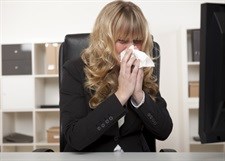
Related
Top stories





Energy & MiningGlencore's Astron Energy gears up with new tanker amidst Sars dispute
Wendell Roelf 11 hours

More news



















Logistics & Transport
Uganda plans new rail link to Tanzania for mineral export boost









Why are South Africans so intent on coming to work when they have a cold?
A hardy 48% said they just could not afford to take a day off work due to mounting workloads, 33% argued that they are too essential to the business operation and 12% go into work sick, hoping the boss will send them home. A disturbing 17%, however, said their employer discourages them from taking sick leave or when they do, they are penalised for it and a further 11% fear of losing their jobs when they do take time off to recover.
Mariska van Aswegen, spokesperson of Pharma Dynamics says many organisations have reported a growing culture of 'presenteeism' in the workplace, which usually leads to lower-than-normal productivity levels and can cost employers more than it would if sick employees would just take a sick day.
"Studies show that productivity levels only drop to about 28% when employees take sick leave compared to a much more significant drop of 72% when they show up at work feeling lousy."
She attributes this trend to the prolonged economic stagnation. "To some, physically showing up at work every day means job security. People want to make sure that they are not forgotten about and want to prove that they are committed to their jobs."
However, with more sick employees hovering around the office, the risk of spreading viruses and making others sick increases substantially.
"The working sick leave behind a trail of germs on shared surfaces, such as stair rails, door handles, water coolers, communal fridges, counters and light switches, putting others' health in jeopardy. Cold and flu viruses can easily spread in public spaces such as an office and even more so when there is no proper ventilation."
While many South Africans do whatever it takes to stay germ-free by using hand sanitizers, disinfectant wipes or soap, an inconsiderate 38% who took part in the survey do not.
"Even though you may not be able to change your co-workers' bad habits, you can protect yourself by washing your hands often enough, especially after you've come into contact with a sick colleague, before eating and after using the restroom. Also avoid touching your eyes, mouth and nose at all costs and clean your desk, including your telephone, cellphone and keyboard with antibacterial wipes at least daily."
For the 85% suffering from 'presenteeism', van Aswegen suggest asking yourself the following questions to assess whether you are too sick to report for duty:
"If you simply have to work, try working from home. This way you will reduce the spreading of germs while still dealing with urgent work, plus you can nap in between to give your body the rest it needs to recover."
Another interesting finding that the survey yielded was that 9 in 10 participants still prefer to first self-medicate a cold or flu rather than going to a GP.
"The best way to make sure that you choose the appropriate over-the-counter (OTC) medication to treat a cold or flu is to understand the different active ingredients and the symptoms they treat.
"There are four major active ingredient categories related to cold and flu symptom relief, which are analgesics, nasal decongestants, cough suppressants and expectorants. It is also important to take other conditions like heart disease or asthma into consideration, so always ask your pharmacist for advice to help you determine the correct course of treatment for you," concludes van Aswegen.